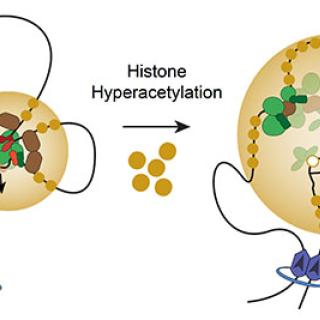Our Discoveries
New technology elucidates how metabolites interact with proteins to drive cancer
Acyl-coenzyme As (CoAs) are a group of small molecule metabolites that are the building blocks and chemical energy source for all living organisms. Recent evidence indicates that metabolites such as acyl-CoAs can also interact with proteins to drive the development of cancer.
Read MoreSide effects of CAR T-cell therapy are dramatically reduced with new receptor
A new immunotherapy for lymphoma has been found to cause lower levels of neurologic toxicity than other T-cell therapies for lymphoma. The findings come from the first clinical test of a CAR T-cell therapy using a new anti-cancer T-cell receptor developed in the Center for Cancer Research.
Read MoreGenomic profiles of lung cancer differ based on ancestry
An analysis of tumors from people with non-small cell lung cancer by researchers at the Center for Cancer Research revealed differences in genomic instability and homologous recombination deficiency in tumors from people with African ancestry compared to those with European ancestry. These findings highlight ancestry-related differences in tumor biology and may help improve our understanding of the higher incidence of cancer burden and high mortality observed in African Americans.
Read MoreProtein affecting cell division hints at a way to overcome drug resistance
Researchers have uncovered the way in which a protein, called CLR4, helps complete the cell division process. The mechanism could potentially be harnessed to overcome resistance of cancer cells to chemotherapy drugs such as paclitaxel.
Read MoreBinding preferences of Ras and Raf yield clues for developing targeted cancer therapies
Using living cells, researchers in CCR have found that a set of enzymatic proteins, known as Raf kinases, have differing affinities in how they bind to a class of cancer-related proteins, known as the Ras GTPases. This could offer new strategies for developing more effective targeted therapies.
Read MoreHistone deacetylase inhibitors block cancer-driving gene networks by obstructing DNA folding
Studies of the pediatric cancer rhabdomyosarcoma have revealed an unexpected way to intervene in cell-identity-determining networks that are abused by many aggressive cancers.
Read MoreDifferences between anti-viral and anti-tumor T-cell responses could impact immunotherapy
A finding published in Cell Reports holds promise for resolving some of the conundrums surrounding CD4+ T cells and their potential in fighting cancer. The work found that CD4+ T-cell responses to tumor antigens are quite different from those to infections, highlighting a need to re-think how to harness the power of CD4+ T cells.
Read MoreDifferences between anti-viral and anti-tumor T-cell responses could impact immunotherapy
A finding published in Cell Reports holds promise for resolving some of the conundrums surrounding CD4+ T cells and their potential in fighting cancer. The work found that CD4+ T-cell responses to tumor antigens are quite different from those to infections, highlighting a need to re-think how to harness the power of CD4+ T cells.
Read MoreNew findings hint at therapies for African Americans with lung cancer
A study published in Nature Communications reveals that two genes tend to be mutated at higher rates in cancerous lung tissue samples taken from African Americans, hinting that these patients may benefit more from certain therapies targeting those genes.
Read MoreUnlocking the key to HIV persistence
Even though antiretroviral therapies have allowed many people to live long lives, ridding the body of HIV completely has been an elusive goal ever since the discovery in the 1980s that HIV causes AIDS. New research from the Center for Cancer Research shows that proviral DNA sequences and their integration at specific sites could provide clues for researchers developing drugs to eradicate AIDS.
Read More







